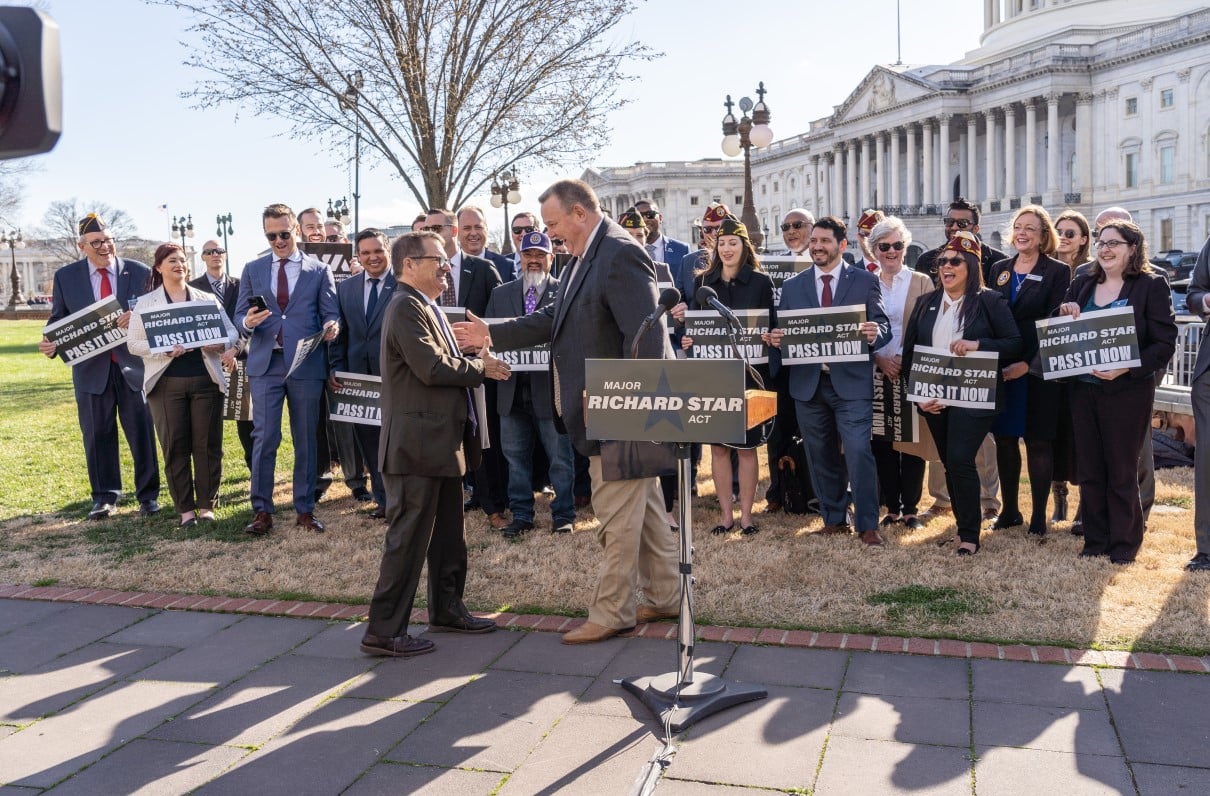By MOAA Staff
MOAA’s work to end a longtime injustice faced by combat-injured veterans has shifted focus from the House to the Senate, as we join dozens of fellow military and veteran advocacy groups seeking the inclusion of the Major Richard Star Act in the must-pass annual defense authorization bill.
We need your help in securing support from your senators for a floor vote on an amendment to the FY 2025 National Defense Authorization Act (NDAA) which would include the Star Act in the legislation … and securing their commitment to vote “yes” on the amendment when it goes to the floor. Some senators may publicly support the legislation but dismiss it as too expensive behind closed doors – they need to hear from their constituents so they realize their actions over the coming days will speak to their true level of support for those who serve and have served, and their families.
[TAKE ACTION: Ask Your Senators to Support a Floor Vote for a Star Act NDAA Amendment]
The House Path
The Star Act, which would reverse existing law requiring tens of thousands of combat-injured veterans to give up a dollar of earned DoD retirement pay for every dollar of VA disability compensation received, has 326 House co-sponsors, but it was not included in that chamber’s version of the FY 2025 NDAA.
Two proposed NDAA amendments – one with the text of the legislation, another that would end the offset over the span of three years – were not “made in order” by the House Rules Committee and were thus ineligible for NDAA consideration. Amendment No. 1072, which included the full Star Act Text, went to a recorded committee vote, where it was defeated 4-9.
[NDAA CHECKPOINT: Where the Bill Stands, and What It Could Mean to Your Benefits]
Five of the “no” votes came from House members who also co-sponsored the initial Star Act legislation. While MOAA will continue to engage these leaders and other House members on the issue as the NDAA continues to take shape, our primary mission – and the area where we need your help – is our work to get the Star Act text into the Senate NDAA.
The Way Forward
Senate Armed Services Committee members did not include the text of the Star Act in their initial version of the NDAA, but that chamber’s amendment process will not begin until after the July 4 holiday, giving constituents enough time to make their voices heard in their senators’ offices.
MOAA has worked with Sen. Jon Tester (D-Mont.), a longtime champion of the legislation, on bringing a Star Act NDAA amendment to the floor for a vote. That’s where our members, thousands of whom have already contacted their legislators in support of this legislation, will again be called upon to make a difference.
- Visit MOAA.org/StarAct and send our updated message to your senators. It’s a two-part request: Support our efforts to ensure the Star Act amendment receives a floor vote, and vote in favor of the amendment once it reaches the floor. As we’ve seen in the House NDAA proceedings, prior support and/or sponsorship for the bill does not always translate into meaningful action – this election year, constituents need to send a message to their senators that words aren’t enough.
- Reach out to your senators' offices via MOAA's toll-free line to the U.S. Capitol switchboard – 866-272-MOAA (6622). Ask to speak with the military legislative assistant. Use these talking points, or refer to MOAA’s Star Act one-pager for additional materials.
- Share all the above materials with your personal and professional networks – you don’t need to be a MOAA member to send messages through the Legislative Action Center or to call our switchboard.
With the end of the 118th Congress approaching, moving the Star Act forward via the Senate NDAA process may be the last chance to take advantage of the significant progress made, and the work done by MOAA members and others throughout the nation, on behalf of combat-injured veterans.
Even if you’ve reached out multiple times to your senators, do so again to remind them of how critical this bill is to you as a constituent, to those suffering the wounds of war and their families, and to the health of the all-volunteer force, as future members consider whether they’d be treated fairly should they be injured in the line of duty.
Write your senators today, and keep up with MOAA online and on social media (Facebook | X | Instagram) for the latest updates.
When MOAA Speaks, Congress Listens
Learn more about MOAA’s key advocacy issues, and contact your elected officials using our messaging platform.
